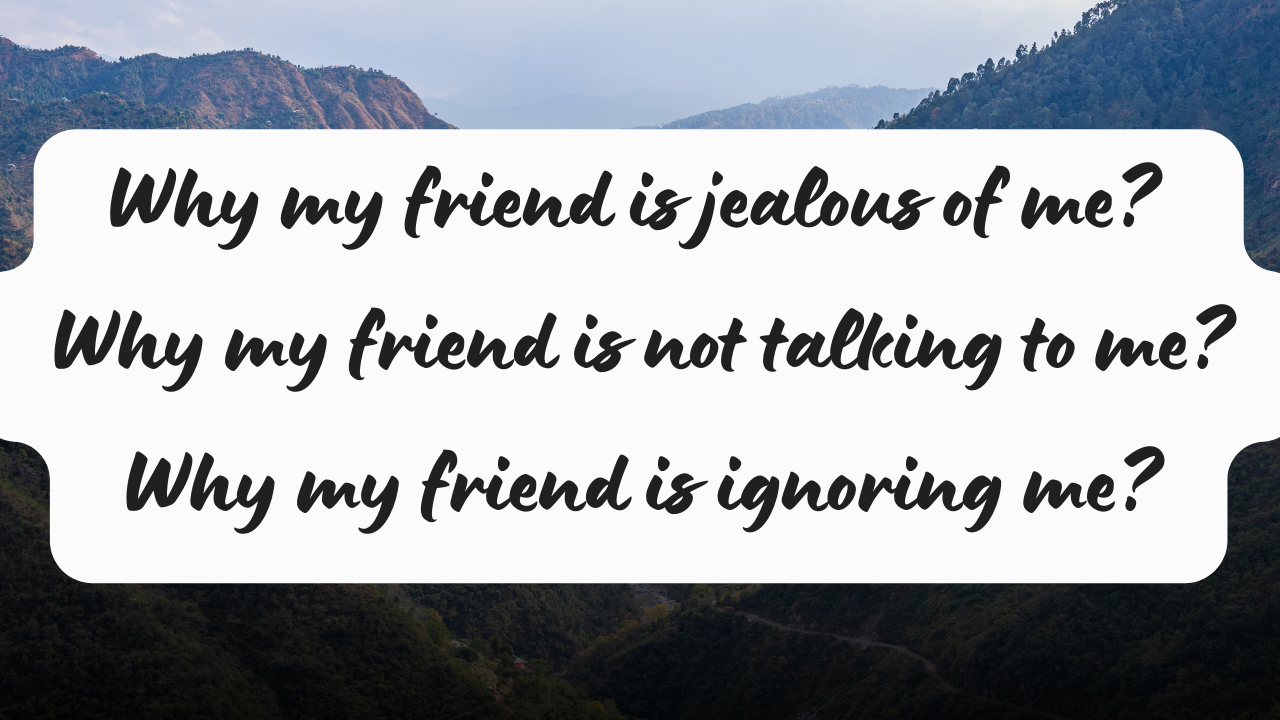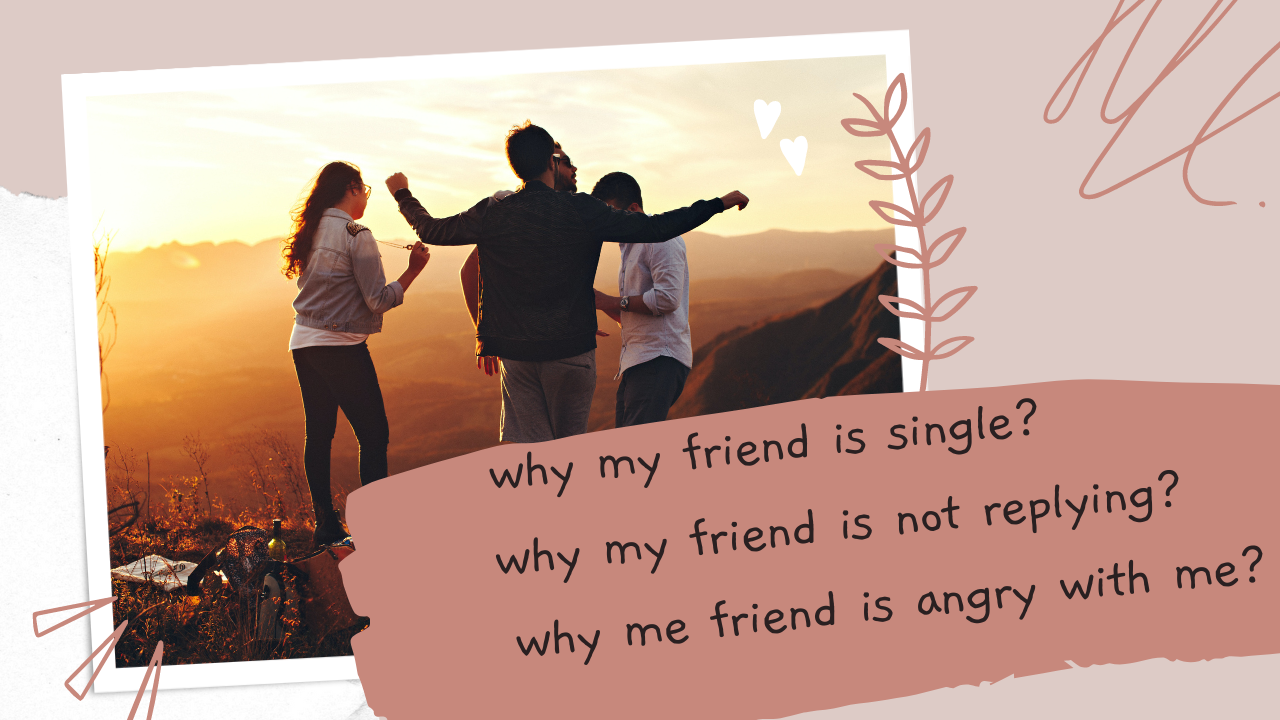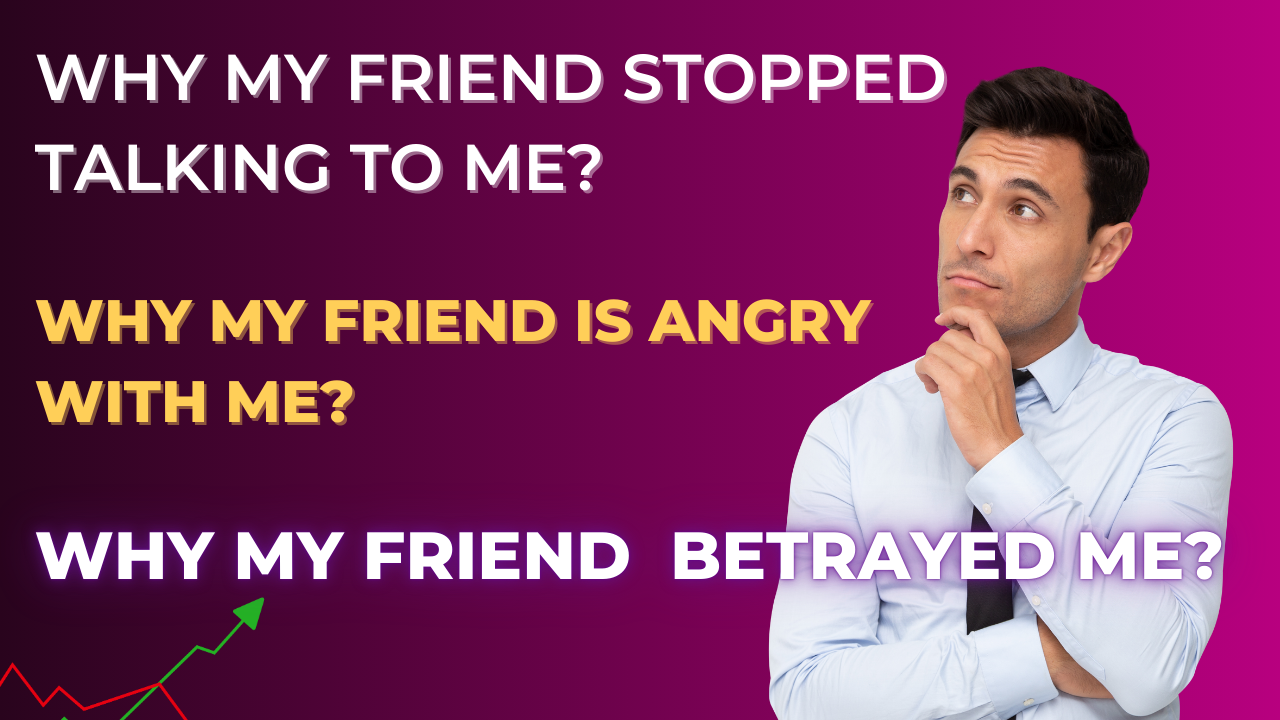Frequently Asked Questions
Why my friend is jealous of me? – Wisher
Jealousy in friendships can be tough to navigate, especially when it feels like someone you care about isn’t genuinely happy for you. If you’re noticing signs that your friend might be jealous, it’s important to address the situation thoughtfully to preserve the friendship while also protecting your own emotional well-being. Here are some signs that might indicate your friend is struggling with jealousy and what you can do about it.
One of the most telling signs of jealousy is if your friend responds coldly to your good news. Instead of celebrating your achievements, they might seem uninterested, give a lukewarm reaction, or even try to overshadow your moment by sharing their own news. True friends typically show genuine happiness for each other’s successes, so if your friend’s reactions feel off, it might be a red flag.
Another indicator is if they criticize others in your life. A jealous friend might make negative comments about people close to you, possibly as a way to distance you from them. Rather than having a constructive conversation about any concerns, they might just criticize, which can create unnecessary tension. A supportive friend, on the other hand, would express their thoughts in a caring and honest manner.
You might also notice that your friend tries to upstage you. In conversations, they could frequently interrupt to share how their experiences were better or more impressive. They might also brag about attending more exclusive events or having more exciting news, trying to shift the focus away from you. This behavior often stems from their own insecurities and desire to feel superior.
Another subtle but telling sign is if they imitate you. If they suddenly start mimicking your interests—whether it’s in music, fashion, or hobbies—it could be a sign of jealousy. While it’s flattering to be admired, it’s also important to encourage your friend to embrace their own individuality and find what makes them unique.
If you’ve heard that they talk about you behind your back, this could be another sign of jealousy. Pay attention to how they gossip about others; if they often speak negatively about people, there’s a chance they might be doing the same to you. If you suspect this, it’s best to confront them respectfully with the facts and discuss how it’s affecting your trust.
Jealousy can also manifest in more passive ways, such as when they project their insecurities onto you. They might frequently seek validation or compare themselves to you, which can strain the friendship. In these cases, it’s important to recognize that their behavior might stem from low self-esteem, and supporting them in building their confidence can help ease the tension.
Another sign is if they’re never there for you when you need support. If you’ve noticed a pattern of unsupportive behavior, it’s worth considering whether your frequent sharing of successes might be contributing to their jealousy. Having an open discussion about how both of you can support each other better can help address this issue.
Lastly, if they start pulling away from you, especially on social media, it might be a sign of jealousy. If they’re avoiding interactions or seem distant, it’s important to ask them about it and see if you can work together to mend the friendship.
If you suspect jealousy is affecting your friendship, the best course of action is to have an honest discussion about your concerns. Approach the conversation with empathy and a genuine desire to understand their perspective. Sometimes, suggesting that you take a break from sharing certain types of news might give them the space they need to process their feelings.
Encouraging them to explore their own interests and celebrating their unique strengths can also help, as jealousy often stems from feelings of insecurity. If, however, they refuse to address the issue or the friendship becomes toxic, it might be necessary to distance yourself for your own well-being.
Addressing jealousy directly but compassionately is key. With open communication and a willingness to understand each other, it’s often possible to work through jealousy and strengthen the friendship.
Why my friend is not talking to me?
When a friend suddenly stops talking to you, it can be confusing and hurtful. Understanding the possible reasons behind their silence might help you approach the situation with empathy and patience, allowing you to handle it in a way that respects both your feelings and theirs.
One reason your friend might not be talking to you could be that they’re dealing with personal struggles. They might be facing issues such as depression, anxiety, or other hardships that make it difficult for them to reach out. In situations like this, their withdrawal might not be about you at all, but rather something they’re struggling with internally. It’s important to remember that sometimes people retreat when they’re dealing with difficult emotions, not because of anything you’ve done.
Another possibility is that your friend is taking a hiatus from social interactions. There are times when people need to recharge and focus on themselves, which might involve pulling back from their usual social circles. This could be a temporary phase where they need space to figure things out or simply to relax without the pressures of maintaining constant communication.
Sometimes, friends grow apart naturally as life changes. Differing interests, new priorities, or life paths can lead to a gradual distance between friends. This is a normal part of life, though it can feel like a loss when it happens. Growing apart doesn’t necessarily mean the end of the friendship, but it may require adjustments in how often and in what ways you communicate.
An unresolved conflict could also be the cause of their silence. If there has been a disagreement or issue that wasn’t addressed, it might be creating tension between you two. Unresolved conflicts can lead to passive-aggressive behavior or a complete withdrawal as your friend avoids dealing with the discomfort the issue has caused.
Another reason could be that the friendship has become one-sided. If your friend feels like they’re giving more than they’re receiving, it can lead to feelings of resentment and eventually cause them to pull away. This can happen if one person is always seeking support without offering the same in return, making the friendship feel unbalanced and emotionally draining.
Sometimes, friendships can become toxic due to unhealthy behaviors like negativity, criticism, or manipulation. If the relationship has reached this point, your friend might choose to distance themselves for their own well-being. It’s important to recognize when a friendship isn’t healthy for either person involved and to respect their need to step back.
Lastly, a change in life circumstances might be at play. Major changes such as a new job, relationship, or other personal responsibilities can shift a person’s priorities, leaving them with less time and energy to invest in friendships. This isn’t necessarily a reflection of their feelings toward you, but rather a natural consequence of their changing life situation.
If you’re unsure why your friend has gone silent, there are a few steps you can take. Reaching out can be a good first move. A simple message expressing concern and a willingness to talk can show that you care and are open to understanding what’s going on. If you feel there might be an unresolved issue, it’s also important to reflect on the friendship and any recent interactions that may have contributed to the situation. Be ready to apologize if necessary and to discuss things openly.
At the same time, it’s crucial to give them space if they need it. If your friend is dealing with something personal, respecting their need for distance while letting them know you’re there for them when they’re ready to talk can be very supportive.
Finally, if despite your efforts your friend continues to ignore you, it might be time to evaluate the friendship. Sometimes friendships change, and it’s important to focus on relationships that are mutually supportive and fulfilling. This doesn’t mean the friendship has to end, but it might need to shift to accommodate new dynamics.
Understanding the reasons behind your friend’s silence can help you approach the situation with clarity and compassion, giving you the best chance of resolving any issues or finding peace with the changes in your relationship.
Why my friend is ignoring me?
When a friend starts ignoring you, it can be confusing and even hurtful. Understanding the possible reasons behind their behavior can provide clarity and help you respond thoughtfully. Here are some reasons why your friend might be pulling away and what you can do about it.
One reason could be that your friend is dealing with personal struggles. Life can get overwhelming, and sometimes people retreat when they’re facing emotional difficulties or stress. Your friend might be going through something tough, like depression, anxiety, or a major life challenge, and they may not feel ready to share it. This withdrawal might not be about you at all but rather their need for space to process what they’re going through.
Another possibility is that there’s been an unresolved conflict between you two. If you recently had a disagreement or a misunderstanding, your friend might be avoiding you to cope with their own emotions. They might be unsure how to approach you or could be feeling guilty about something that happened. Sometimes, when conflicts aren’t addressed directly, it can lead to avoidance and create more distance in the relationship.
Your friend’s behavior might also be due to changing priorities. As people grow and evolve, their interests and priorities can shift. It’s possible that your friend has met new people or become involved in new activities that take up more of their time. This doesn’t necessarily mean they value your friendship any less, but it can lead to less frequent communication as they adjust to their new routine.
Another reason could be that your friend is feeling overwhelmed. Life can get busy with work, school, or personal commitments, and during these times, friendships can unintentionally take a backseat. Your friend might be so consumed with other responsibilities that they’ve unintentionally neglected to reach out or stay in touch.
Sometimes, friendships can drift apart when there’s a lack of common interests. As your lives change, you may find that you no longer share the same hobbies, passions, or life experiences. This can create a feeling of disconnect, leading your friend to pull away because they don’t feel as close or connected to you as before.
Lastly, your friend might be feeling too much pressure from the friendship. If they feel that the relationship is demanding too much attention or emotional support, they might distance themselves to regain their personal space. This doesn’t mean they don’t care about you, but they might need time to recharge and feel more balanced.
If you’re facing this situation, there are several steps you can take. Reaching out with a simple, non-pressuring message can show that you care and are open to talking whenever they’re ready. Sometimes, just knowing you’re there can make a big difference to someone who’s struggling.
It’s also important to give them space if that’s what they need. Respect their boundaries and allow them the time to sort through their feelings. Pushing too hard might make them retreat further, so patience is key.
During this time, it might help to reflect on the friendship. Think about any recent interactions that could have contributed to the situation. If you suspect that something you did upset them, be prepared to address it when they’re ready to talk. Apologizing and discussing things openly can help mend any rifts.
While you’re waiting for your friend to reach out, it’s a good idea to focus on other relationships. Spending time with other friends who are supportive and positive can help you feel less lonely and provide emotional balance during this uncertain time.
Understanding why your friend might be ignoring you can help you approach the situation with empathy and patience. Open communication, when the time is right, can often resolve misunderstandings and bring you closer again. If not, at least you’ll know you’ve done your best to handle the situation with care and respect.



